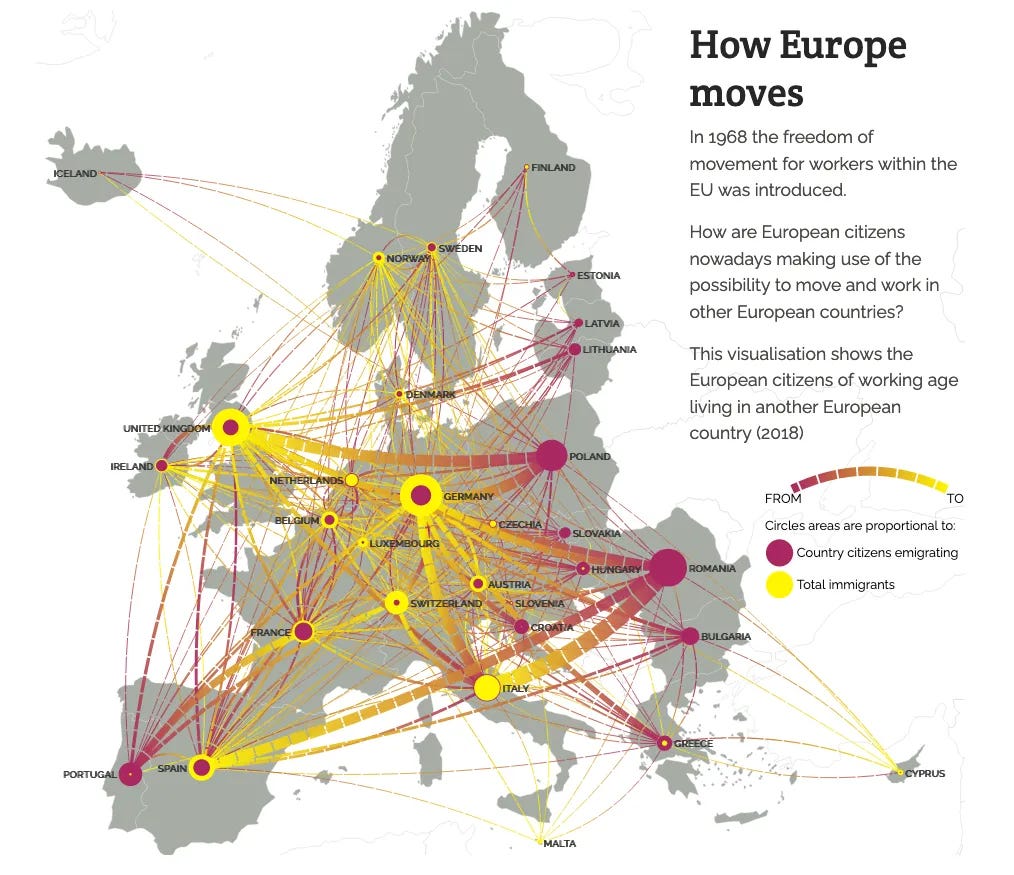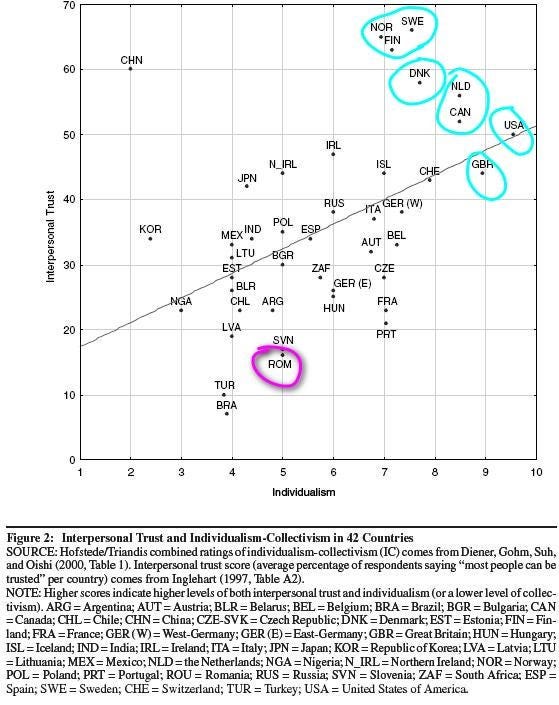Social trust in Romania I: an introduction
If ever a poast on Romania demanded the full rogering, it's this one
Let’s get straight into it.
Take a look at this chart from HBD Chick. Romania is circled in pink; four of the five Nordic countries, along with the Germanic-speaking NW European nations (and North American offshoots), are circled in blue.
As you can see, Romania suffers from the lowest social trust of countries surveyed (composite data from two separate studies, 1997 and 2000). No European country rates lower. Worldwide, only Turkey and Brazil come out worse.
It’s beholden on me to point out that the parent studies are old now, so things could have changed drastically in the meantime (they haven’t). Even granting that (?(?(?for obvious reasons?)?)?) Western European social trust is in decay, Romania was—and by European standards still is—practically a no-trust society. Why?
According to this chart, the country is only moderately collectivist. Even in Europe, all the Baltic states and Belarus are rated as more collectivist than Romania, while Bulgaria, Poland and Northern Ireland are equally so. Therefore, the correlation postulated by some HBD geeks between low trust and high collectivism is not a satisfactory explanation. The effects of communism are similarly insufficient on their own to make sense of things: as measured here, Romania’s social trust is a good deal lower than that of any other ex-communist nation, except formerly ‘non-aligned socialist’ Slovenia. Neither does immigration represent a plausible accounting. Romania has not yet become a favoured destination for the turd world, although...

But never fear: if only in the interests of generating ‘content’ for muh stack, I think I can with difficulty identify and partially disaggregate four causes of low social trust in Romania.
Cause 1: the missing middle
The first cause is the historical absence from Romania of a middle class in the Western European mould, whose behavioural trait package, developed under at least 600 years of gene-culture coevolution, engendered a high-trust but individualistic social environment in which cohesion was once reliably maintained by what I will call ‘The Seven Cs’: Conscientiousness -> Civility -> Credibility -> Compromise -> Covenant -> Constancy -> Comity.
I dunno…you reckon ‘Seven-Cs’ is a catchy mnemonic I could use to get a book-publishing deal with Simon & Schuster????

Cause 2: the rise of the parvenu
A second and related cause is the composition of the post-communist Romanian middle class: its parvenus, its New Men. The parents of these people were generally members of the rural commons or urban working class, in most cases themselves fresh from countryside to factory. They are socioeconomically middle class, tending to occupy jobs in the services sector, but usually retain to varying but noticeable degrees the taciturn suspiciousness, the delight in deception and the grasping zero-sum mentality of the peasant. They are not by nature people of the ‘Seven-Cs’.
Cause 3: communism
A third cause is to be located in the 50-odd years of communism (1947-1989) endured by the Romanians. In its first couple of decades the country’s inchoate native commercial middle class was destroyed and a heavy outer-party bureaucratic apparatus constructed. Its apparatchiks did as their equivalents across the Eastern Bloc, where commodity scarcity was almost constant. They used their position as intermediaries between state and populace to supplement their incomes via petty larceny, at the expense of the common purse.
At a reduced scale this parasitic state-dependent middle class endures, as do habits of subterfuge, graft and outright theft among other social classes. To some extent the low-trust behaviours typical of people living under communism have unavoidably infected later generations, including members of the new middle class. Though the dictatorship of the proletariat is 35 years in the past, the race to the bottom has not ended. The imperative remains among a great many people of all classes: grab resources and position rapidly and opportunistically, rather than assiduously accumulate and curate them by honest means.
As I will demonstrate in due course, however, this pattern of habitual mendacity, and the high-time preference accumulation strategy associated with it, was more reinforced by than rooted in Romania’s communist phase. It has a number of well-attested historical precedents that go back much further in time.
Cause 4: the home-ground diversity ‘advantage’
The fourth cause of low social trust in Romania is the free market’s rapid emancipation of its Gypsy population—which followed decades’ worth of partially successful communist attempts at sedentarisation/relocation—and the uneasy assimilation, culturally and genetically, of Rom and Romanian.
The Gypsy ‘community’ is—almost, sort of, sorry to say—‘indigenous’ to Romania. Its presence dates to the 14th century, shortly after the traditional date of the Romanian ‘Dismounting’. This is around the same time as the English middle class began its ascent from the manor (a strange historical coincidence indeed!)
The Gypsy population of Romania is very large, though nobody really knows exactly how many of them there are. This numerical vagueness can be attributed to four factors:
First, the premodern non-conformity of semi-nomadic Gypsy lifeways, and thus the Gypsies’ non-responsiveness to census-taking, so that the TRVE TRAD members of the race are not included in official statistics;
Second, the Gypsy predilection, where it is both to their purpose and practicable, for crypsis; many will not declare their ethnicity because for one reason or another it suits them to pretend that they are Romanian;
Third, their latterly intermittent presence in the country, interspersed with residency in other nations, most commonly Spain, Germany, Italy and the yookay;
Fourth, their increasing…interpenetration with ethnic Romanians.
What can be stated confidently of their numbers is that Gypsies make up at least four per cent of the resident Romanian population—a figure in uncommon flux for the last 20 years or so, owing to emigration to W Europe, but at most times around 20 million.

For what little it’s probably worth, the Council of Europe estimates, no doubt with the expansion of EU bureaucratic meliorism in mind, that Gypsies constitute nearly nine per cent(!) of the total population of Romania. For the present, let us say that the real figure is around five per cent.
Conservatively, it can be further reckoned that there are 500,000 to a million more ‘Romanian’ Gypsies infesting other EU and non-EU countries. For example, in 2018 Canada imposed stricter-than-previous entry requirements for Romanian citizens in response to the number of Gypsies arriving, under cover of bogus asylum claims, to establish organised crime rings and take ruthless advantage of its terminally high-trust sucker Anglo population—though the ethnic dimension was of course never officially admitted.
In addition, there are many Romanian citizens who are of either full or, more frequently, half Gypsy background but who do not identify as Gypsies. I am friends or acquainted with five to ten such people. Shame or plain genealogical ignorance precludes some of them from confirming what I know to be their piebald ancestry (how very Roman Romania can sometimes be!). For these reasons and others, accurately judging the number of half-breeds is difficult; but it is substantial.
Though it is hard to tell just by looking at these obviously mixed people whether their allegiance is to Gypsy or Romanian interests, it is sometimes possible to judge by the way they speak—and I do mean sometimes. This margin of uncertainty is far from socially trivial, as I aim to show later on.
For now, though, a final note: it’s hardly worth mentioning that Gypsies, whether full or part, are not by breeding or acculturation ‘Seven-Cs’ people either.
HAVEN’T I SAID IT ALL NOW? WHAT FURTHER SLANDERS CAN I POSSIBLY HAVE IN STORE TO JUSTIFY SPINNING THIS SPECULATIVE RUBBISH OUT INTO SEVERAL PARTS?
I have dealt with cause 1 in several pieces prior, so I will not belabour it further—at least not too much. Cause 2, like cause 1, has deep roots and I have discussed it briefly elsewhere; yet it deserves and will receive more detailed treatment in the next post or the one after something like that. About cause 3, however, I have nothing more to say, except where it bears on cause 4—this being the matter on which I intend to entertain (i.e. bore/outrage) you at greatest length in the series of poasts to follow.





Woooo.
Let me tell you, I already read all of the series yesterday and these are fantastic (Remember starting reading theae before after I found you but got distracted...). I would love to write things about Hungary this way, but still lack the necessary knowledge and writing skills to be honest. Still, if I ever get there, I must reference these articles because there are many similarities, but also some differences too.
I also see that James is here too and I'm sure he can add valuable information to the subject, but I think he will be limited by the lack of interaction with 'them'. No offense meant. Still, hopefully I can add to the discourse.
Now, back to the subject. The causes for the low trust society are mostly the same over here. The middle class/civil society got massacred over here too. Still, this might have been the point where Hungary had a little bit of headstart despite being hindered by centuries of warfare with the turkish. Things really got going during the 19th century and...yes, here comes the obligatory Trianon reference. We lost too many of the cities (cities that had hungarian/german majority even if the countryside was other nationalites). Many of those who found themselves on the wrong side of the border did emigrate, but that almost always came with a loss of status and means. The real sting was the expulsion of the danube schwäbisch though after the WW2.
The parvenu is also a great element for this. During ths wild capitalism and privatisation years many people got rich fast(too fast and people knew what it was about) and almost all of them was deserving of the nook. But this place is too limited here for that.
For communism, the main difference was tha lighter restrictions for private enterprises.
And for the minorities. As James pointed out, you can't speak about it openly but most will have strong opinions about them. I would add that speaking openly in negative terms about any minority(past or current) is considered an ultimate 'faux pass'.(On hungarian reddit the slightest mentioning of them are results an instant lock of the thread while you can spew as much bile on the "peasants"/countryside people as you want) But you would be surprised how thin this barrier can be. Still, the inner city intelligentsia rules over this discourse while probably being the only ones who don't have experience dealing with them. This is partially because there are different groups of them that can be antagonistic even against eachother. And Budapest mostly got the more controllable ones.(this is changing though, and the city dwellers are not happy)
I'm originally from the northeastern part of the country so I have far too much experience with them. All I can say here, that the things are far worse in terms of cultural and other dominance than many even can imagine.
The Gypsies are a fascinating breed indeed, we have a tonne of them here in Hungary, too. You are right to say that it is difficult to know their "allegiance", though here most of the population views them as a nuisance that commits a lot of crime and has a lot of children. And I do mean A LOT. For the first three years I lived here—when I was a disillusioned classical liberal—I thought the Hungarians were just racist, but now I know better.
It is wise to judge the Gypsies individually (many are fine people), though you know when you're dealing with one who could erupt into violence at any moment. Many of them are remarkably vulgar; and no, they do not observe the seven Cs you mention. I'm not sure they observe even one of those Cs.
Actually, many here are concerned about demographic change related to the Gypsies and I don't blame them. Is it the same in Romania? Hungary is not interested in cultural suicide like the rest of the West, yet the Gypsies are, at times, a concerning menace in Hungarian society. Perhaps mercifully, many are priced out of Budapest. I'm told that they dwell predominantly in Eastern Hungary.
And yeah: it's a catchy mnemonic that *could* get you a deal at Simon & Schuster; they gave one to Nancy Pelosi, after all (I'm sure she had a ghostwriter). With your permission, I might reference it in upcoming essays. Coining stuff is fun, eh?